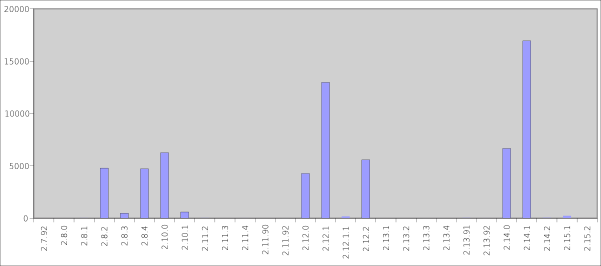The software behind blogs.gnome.org (NewsBruiser) has an interesting default. By default the feeds only give the entries for the current month. So if you make a post minutes before a month ends, likely no planet will show your post.
I couldn’t really understand how I could fix this safely (without breaking other stuff), so I’ve added a hack instead. The feeds from blogs.gnome.org will now always show the last 15 entries. There is some code in there so you can get a feed specific for a year. This is probably broken now.
I checked the server logs and nobody seems to be using anything but the standard syndication URL, so above hack shouldn’t cause any problems. If you find your feed is broken, please file a bug. And please post a patch as well 😉
A few more patches I made for Bugzilla (official one, not b.g.o) have been accepted. Bugzilla 2.24 (or the not-yet-released 2.23.2) will now have a preference to control the initial state of the ‘Add me to the CC-list’ checkbox. By default it is checked unless you have a role (reporter/assignee/qa contact) on the bug.
An important patch is one that detects if the user is trying to submit the same bug multiple times. This could happen if a user refreshes the post_bug.cgi page. Due to some dynamic content on the post_bug.cgi the obvious fix (redirect to show_bug.cgi) could not be done. The patch will give a warning when the users tries to submit the same bug again (for more details, read the bugreport).
Another one that was accepted a while ago adds a X-Bugzilla-Watch-Reason. It changes the existing X-Bugzilla-Reason header to only contain the reasons why you are on a bug (Assignee, Reporter, etc). If you are only watching people on a bug, X-Bugzilla-Reason will contain None (handy for filtering). The X-Bugzilla-Watch-Reason will contain None if you are not watching anyone on the bug. If you are watching someone it will contain the reasons and also the email addresses you are watching. I plan to merge this patch into bugzilla.gnome.org soon (currently we do differ between being a role and watching a role, but it all ends up in X-Bugzilla-Reason).
LpSolit (Bugzilla developer) is currently working on moving the CheckCanChangeField function from process_bug.cgi to Bugzilla/Bug.pm. This function checks if the current user is allowed to change a field (priority/version/summary/etc). When this is done I’m going to change the show_bug.cgi template to use this function and only allow the user to change the fields they are allowed to change. The end result will be like on bugzilla.gnome.org, except on b.g.o I hard-coded the permissions in show_bug.cgi, while the upstream version will use the same function for the UI as well as the backend.
